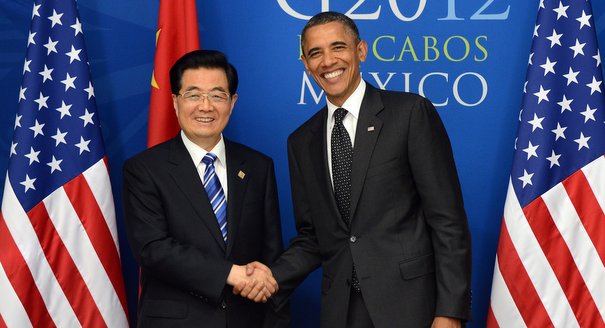Over the past few days, there have been lots of articles and radio programs about the elections in the United States and China, two major events that just happened to coincide with each other.
Mark Leonard, director of the European Council on Foreign Relations, argues in his most recent blog that the leadership elections were “almost perfect mirrors of each other.”
A special early morning round table this past Sunday on the BBC World Service that brought together experts from Beijing, Washington, and Hong Kong, focused on the differences, but also the interdependence of both countries.
There is another aspect to these two crucial elections that has not been fully explored: they herald the emergence of a new bipolar world.
This emerging new world order is very different from the bipolar world that existed during the Cold War.
Then, there was no interdependence between the former Soviet Union, a closed society, and the United States. Both engaged in a fierce ideological struggle in which the world was divided into two camps—despite some attempts by the ineffective Non-Aligned Movement to sit on the fence. There was the capitalist and democratic West and the one-party communist state and its state run economy.
On the ground, whether in Latin America, Africa, or Asia, there was intense pressure by both sides to win over allies. It is not difficult to recall the wars and conflicts that raged in countries as the Soviet Union and the United States vied for influence.
But if there was one issue, and fear, that Washington and Moscow did share, it was MAD: Mutual assured destruction through a nuclear strike. That was why both countries always returned to the negotiating table to discuss arms control.
There is a still a lot of unfinished business between the United States and Russia, including the need for much more radical disarmament agreements. But the tensions and differences between them are now different since the end of the Cold War.
Superpower rivalry is at an end because the Soviet Union does not exist anymore. That does not stop Russia from flexing its muscles at the UN Security Council over Iran and Syria. But it’s a different Russia, and an insecure and prickly one at that.
With the rise of China, and the election of a new communist party leadership that will oversee China’s development over the next decade, the world is drifting back toward a bipolar constellation. The reason is that there are once again two super powers underpinned by military strength: the United States and China.
This new bipolar world means several things.
For some time, the focus has been on China developing ever- closer ties to countries in Africa, Latin America, and its own neighborhood. China’s powerful economy, wealth, and deep pockets, have allowed it to extend its influence.
But Beijing’s expansionism is different from the former Soviet Union’s. The Kremlin was motivated by ideology. It tried to proselytize as it conquered. China, in contrast, is motivated by an insatiable appetite for commodities.
In many countries in Africa, for example, China has extended big easy credit loans and invested in roads and other big infrastructure projects in return for obtaining essential raw materials. Getting to buy those valuable goods is Beijing’s only kind of conditionality, unlike the EU’s attempts to link trade and investments with good governance.
The United States has looked on, helpless against China’s growing presence across the world.
During her eleven-day tour to Africa last August, Secretary of State Hillary Clinton implicitly criticized China for exploiting the continent’s resources and warned countries about becoming too dependent on China.
But while China’s peripateticism has grabbed the headlines and is certainly worrying Washington, another issue is rapidly turning into a major headache.
The United States is worried that China is developing the ability to deny U.S. warships “assured access” to the South China Sea.
The United States believes that to that purpose, Beijing is developing, for example, submarine-launched missiles. This has prompted the Obama administration to shift its strategic compass away from Europe to Asia. For the Pentagon, assured access to all the neighborhoods in the Pacific is a fundamental tenet of America’s strategic culture. Were that to be blocked, Washington fears that its security, economic, and trade interests in the region would be seriously compromised.
This emerging bipolar world is dangerous because it has set off a new arms race. This has negative implications for the non-proliferation regime and for arms control in general but also for long term stability in Asia.
It has implications for Europe too.
Europe cannot be a bystander in what is taking place between Washington and Beijing. Trade and economic ties with China should not be Europe’s raison d’etre especially since Europe has in the past placed great store on disarmament and values.
Nor is it enough for the Europeans to argue that because the United States and China are inter-dependent economically, they will find a way to co-exist because they will have too much to lose.
That is short-sighted.
Europe must work very closely with the United States in making arms control a major issue. This is about preventing the new emerging bipolar world from becoming locked in a dangerous, costly, and unpredictable new arms race in an already potentially volatile region.






